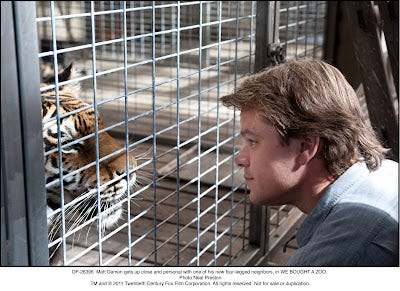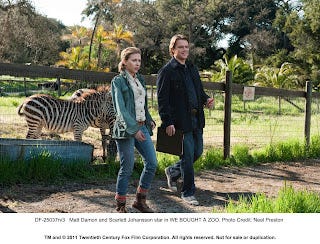Review: "We Bought a Zoo" is a very pleasant return for director Cameron Crowe

Film Rating: B+
We need more Cameron Crowe in the world. I will never understand why reaction to his last film, the pleasant and warm-hearted “Elizabethtown,” was so vitriolic, but it was enough to drive him out of the industry for a long time. After seeing his first film in six years, “We Bought a Zoo,” I think I would much rather live in a world where Crowe delivers a new movie every two or three years. He isn’t one of the great American filmmakers, but he’s a director willing to infuse his films with as much heart and soul as they can bear, an undeniable honesty that is wonderfully refreshing in a time when so many films are made for all the wrong reasons.
Those qualities are the saving grace for “We Bought a Zoo,” which isn’t necessarily a great film. In many ways, it is exactly what I expected it to be given the premise and schmaltzy trailer: thematically over-articulate in some spots, underdeveloped in others, occasionally too desperate for laughs, a bit long in the tooth, and shamelessly manipulative. If you don’t see any moment in the narrative coming a mile away, you must be missing a great majority of your brain cells. In most cases, those elements would be clear and fatal flaws, and I would dismiss the movie. But if Crowe’s career has taught us anything, from “Almost Famous” to “Jerry Maguire,” it’s that being desperate to please and eager to share emotions with the audience doesn’t have to be a bad thing. Here, the excess, over-articulation, and emotional manipulation simply work, at times spectacularly, because this is a film with lots and lots of heart. Crowe doesn’t pull any of his big emotional punches; he earns them, and if it takes a predictable plot or the occasional moment of forced humor to get there, the destination is always worth the journey. Continue Reading after the jump...

“We Bought a Zoo” is adapted from a memoir by Benjamin Mee, an investigative journalist who, after the death of his wife, struggles finding the healthiest way to raise his two children. His 7-year-old daughter, Rosie, is fairly well adjusted, but his 13-year-old son, Dylan, has sunk into depression and misbehavior. After his latest outburst, Dylan is expelled from school, and Benjamin decides he needs to move his kids out of the city. On a house hunt, he finds the ideal home, isolated in nature and surrounded by rolling hills, but there’s just one catch: it’s also a zoo, one that has been closed down for two years while the ever-dwindling staff do their best to take care of the animals. Seeing how happy the creatures make Rosie, however, Benjamin decides to take a chance, buying the zoo, relocating his family, and seeing if he can possibly restore this dilapidated zoo to the thriving attraction it once was.
Needless to say, the rebuilding of the zoo runs parallel to the reconstruction of Benjamin’s life, and I don’t think I can stress strongly enough how the film’s honest, warm tone allows it to get away with a lot of things I usually frown upon. It’s a clichéd story, but “Zoo” proves that there’s nothing wrong with a cliché if done well. Benjamin’s arc progresses organically and engagingly, and I loved that his healing moves in tandem with the creation of the Zoo’s community; not just the people, but the animals as well. The material with one of his children is questionable at times, and I’ll get to that in a bit, but for the most part, this is an exceedingly pleasant story with moments of greatness, and no moment is as impactful as the final sequence. I don’t want to spoil anything, but it may well be my favorite ending to any 2011 film, an ingeniously simple sequence that ties together and enhances everything that works about the story. It may indeed serve as a good litmus test for a person’s humanity, because if your eyes are dry when the credits roll, you clearly need to ask the Wizard for a heart. The ending, for me, is what pushes this from quaint, enjoyable “B” territory to a solid, impressive “B+.”

The film’s greatest critical strength, however, is undoubtedly its cast and the work Crowe gets out of all his performers, young and old, human or tiger. The greatness of Matt Damon has been well established by now, but as Benjamin, he once again reveals new layers of talent. There’s an absolutely heart-wrenching scene near the end where Benjamin forces himself to look at pictures of his wife, and without saying a word, Damon expresses so much about the things his character has been through and the path towards healing a broken soul. Scarlett Johansson isn’t an actress I necessarily consider great, but when a director finds the right way to use her, she can be a very valuable presence, and Crowe gets the most out of her as Kelly the Zookeeper. I would of course be remiss if I didn’t mention that Thomas Haden Church appears in a few scenes to do his wonderful Thomas Haden Church thing as Benjamin’s older brother; he’s an actor one can never have too much of, I think.
But as impressive as the adult performers may be, I was more blown away by the children. First and foremost is Elle Fanning, playing Kelly’s 12-year-old cousin and serving as love interest to Benjamin’s son. It’s an underwritten part, but boy does Fanning do an incredible job breathing life into her character. Between this and “Super 8,” she’s had a fantastic year, and though we live in an age ripe with great young performers, Fanning is in her own league of young elites. I was equally impressed by Maggie Elizabeth Jones as Benjamin’s daughter Rosie; I’m sure this is more a directorial triumph than anything else, and kudos to Crowe for his work, but however it happened, Rosie comes across as a real little girl. She isn’t fake or manufactured or inexplicably full of sage wisdom like so many screen children. She’s genuine, as is her rapport with Damon, and the results are almost unfairly heartwarming.

One of the only characters that doesn’t quite work is Benjamin’s son Dylan. Colin Ford is quite good in the part, but the middle hour of the film gives him one thing and one thing only to do: sit by a tree and draw dark pictures while brooding. It’s as if Crowe forget the character existed for a big chunk of the film and edited in stock footage of one such scene over and over again to create continuity. Dylan is a key character, as his reaction to his mother’s death is fairly violent, but he’s woefully underdeveloped for far too long, especially noticeable when the rest of the film is so thoughtful. The last act brings his arc in the right direction, but I’m not sure if I still cared at that point. He’d spent so long brooding and being an ass that I wouldn’t blame Benjamin for sending him away to a boarding school.

On a technical level, I’ll admit I was disappointed by the visuals. The cinematography doesn’t look particularly cinematic, and when filming in such a clearly beautiful location, the results should be a little more awe-inspiring. It’s not a big deal though, as Cameron Crowe’s expectedly excellent use of pop music makes up for the lack of visual energy. Few directors are so good at finding the right song for each moment, and Crowe is also assisted by a very strong original score from Icelandic musician Jonsi.
In the end, “We Bought a Zoo” isn’t great, but it’s such a pleasant, life-affirming experience, full of inspiring and heartfelt messages, that I don’t really care. Masterful or not, I like seeing movies that put a smile on my face by taking a positive, honest look at life. I want more movies like this. If Cameron Crowe is the guy making them, then he needs to stick around for a long time.
This review was originally published on December 10th. It has been moved up for the film's official release.

